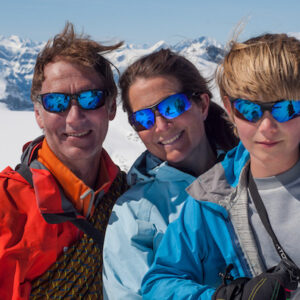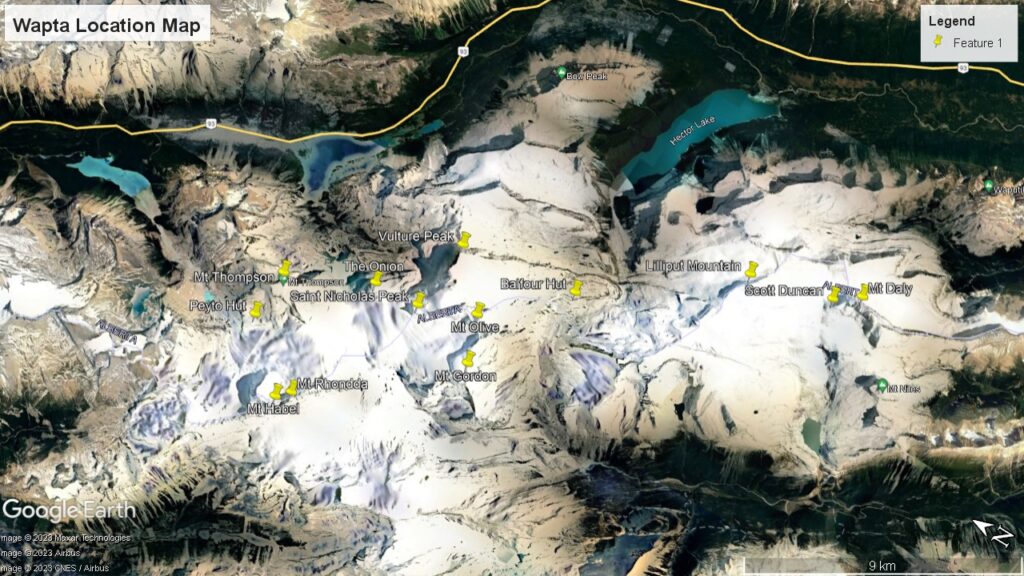- About the ACC
- Membership
- Huts
- Adventures
POLICIES & INSURANCE
- COMMUNITY
- Environment
- Shop
- Give
Crossing frozen lakes, high passes and a vast glacial expanse, the Wapta Traverse is a journey in the truest sense of the word. This Adventure gives you the opportunity to travel hut-to-hut across the length of the Wapta and Waputik Icefields with the opportunity to climb ski mountaineering summits and cut deep powder turns along the way.
Conditions on the Wapta are notoriously changeable. Our knowledgeable ACMG ski guides will ensure you get the most of your four days on the Icefield whilst maximizing safety. Nutritious and lightweight food perfect for the backcountry, will keep you fueled to you maximize your enjoyment of this iconic icefield!
Let us take care of everything from the huts, to the guiding, to the catering and join us on a true ACC Adventure this winter!

BOOKING INFORMATION
Dates:
MARCH: 28th-31ST, 2025
Price: $1,550+ TAX
MORE INFORMATION
Please try to register online before calling. If you are having issues please try to have your emergency contact information and course questionnaire filled out before calling.
OR Call: (403)-678-3200 ext 213
Backcountry Skiing Hazards
Within the overall objective of completing the famous Wapta Traverse there is great deal of flexibility in the itinerary.
Specific ski-mountaineering objectives include Mounts Rhondda (3015 m), Mt Thompson (3084 m), Mt. Hable (3073 m), St. Nicholas (2822 m), Mt. Olive (3130 m), Mt. Gordon (3203 m), Lilliput (2908) and Mt. Balfour (3270 m) and many more. Depending on the conditions the traverse can even offer fantastic powder skiing, for example on the Diableret Glacier close to Mount Balfour.
Although not primarily a skills camp, our guides will also be open to teaching or reviewing important skills – whether it be on roping up for glacier travel, crevasse rescue practice or tips and tricks on hydration and layering.
Our traverse will follow the classic Wapta itinerary, from north to south with visits to three ACC alpine huts (one night at Peyto, one night at Balfour and one night at Scott Duncan). Starting at Peyto Lake, you will ascend to Peyto Hut before making your way across both the Wapta and the Waputik Icefields before descending to the highway near West Louise Lodge. At 45km, the Wapta can easily be completed in 3-4 days by a strong party, with lots of chances to experience the world class ski mountaineering objectives on the route!
No previous mountaineering experience is required, however, you must have backcountry skiing/splitboarding experience and be able to comfortably ski the equivalent of blue/intermediate runs at downhill ski areas in variable conditions (powder, crust, icy etc.) with a heavy pack. Familiarity with touring equipment and the use of avalanche transceivers is also essential as is good all round fitness. You need to be capable of skinning uphill for several hours with a 35-40lb pack.
If you have any concerns about your suitability for this camp please contact the office before registering.
Evenings will be spent enjoying great food, socializing in cozy hut surroundings and resetting for the next day’s skiing. To keep the cost of this trip as low as possible, participants will be responsible for helping to carry the food. There will be a mix of lightweight but nutritious backpacking meals and snacks to keep you properly fueled and hydrated for your adventure. All of our food is provided by specialized backcountry caterers based out of the Bow Valley.
Completing the Wapta wouldn’t be the same without also getting the full ACC hut experience at 3 of our most iconic alpine huts – Peyto, Rob Ritchie (Balfour) and Scott Duncan huts. Staying here is an experience in itself with fantastic views across the mountains and communal and social dining. Guests will be expected to assist the guides with hut duties such as collecting snow for water and cooking and washing up.
Our ACMG certified ski guides will ensure your journey across the Wapta is both safe and enjoyable. Our guides will be welcome to answering questions about the region as well as everything from ski technique to gear. The maximum ratio of guides to participants will be 6:1 to ensure participants can travel at a pace which is right for them and have the chance to ask questions.
The ACC hires guides certified by the Association of Canadian Mountain Guides (ACMG). Visit the ACMG website to learn more about what they do!

Don’t have everything on the gear list (found on the right hand side of this webpage)? We recommend heading to Gear Up in Canmore to grab any items your might be missing. To ensure availability of items call ahead to book. ACC members get a 10% discount.
DOUG LATIMER
Doug has 20+ years of guiding experience behind him as an ACMG ski guide and an ACMG apprentice rock guide. As well as his private guiding he has spent a number of years working for the UoC where he taught a range of instructional programs in avalanche training, crevasse rescue and backcountry ski and ski mountaineering. He also somehow finds time to run a multimedia production company! On top of all that, we are lucky to have Doug as our lead winter guide, where he shares his fantastic enthusiasm and extensive knowledge throughout our winter programs.


We sell Tugo® Travel Insurance suitable for both ACC Adventures and personal trips:
INCLUDED WITH YOUR CAMP FEE
PARTICIPANTS MUST PROVIDE
ORGANIZING FANTASTIC ACC ADVENTURES FOR OVER 100 YEARS
Input your search keywords and press Enter.